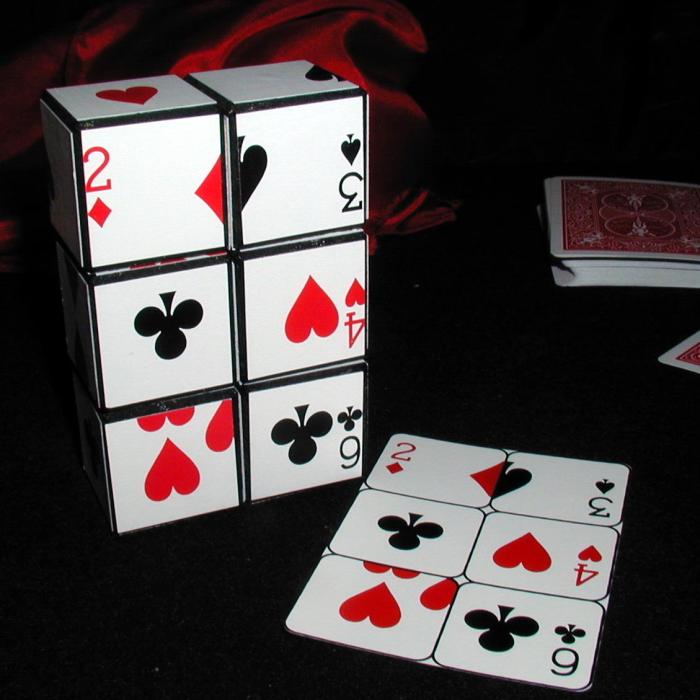
Digital card games have burst onto the scene like a magician pulling a rabbit out of a hat—unexpected and oh-so-entertaining! With the click of a mouse or a tap on a screen, players dive into worlds filled with strategy, competition, and maybe even a few virtual dragons. These games take the traditional card-playing experience and sprinkle it with a dash of digital magic, creating an adventure that can be enjoyed from the comfort of your couch or while waiting in line for coffee.
From the compelling mechanics that keep your heart racing to the vibrant communities that spring up around them, digital card games are more than just a pastime; they’re a phenomenon that has captivated gamers all over the globe. Whether you’re summoning creatures, casting spells, or outsmarting your opponents, there’s plenty to explore in this dynamic universe where cards are king.
Popular Digital Card Games
In the world of digital card games, the blend of strategy, chance, and community engagement has created an electrifying gaming realm. Players dive into these digital decks, wielding cards like wizards casting spells, and with each match, the thrill of victory dances tantalizingly close. Here, we explore the top three titans of the digital card game universe, dissecting their gameplay mechanics and the vibrant communities that surround them.
Top Three Digital Card Games
The realm of digital card games is vast, but a few stand out like glittering gems in a sea of ordinary pebbles. These games not only capture player attention but also foster engaging communities.
- Hearthstone: Blizzard’s card-slinging sensation that has players battling with heroes from the Warcraft universe. Its gameplay mechanics revolve around mana management, card synergies, and strategic deck building. The thrill of dropping a giant minion or casting a game-changing spell keeps players on the edge of their seats. Community features include ranked play, tournaments, and an active forum, allowing players to share strategies and boast about their epic wins.
- Magic: The Gathering Arena: A digital adaptation of the legendary tabletop game that has enchanted fans for decades. Players summon creatures, cast spells, and unleash powerful planeswalkers on their opponents. The game’s mechanics hinge on mana production and intricate card interactions, making every match a unique experience. Community features are robust, with events, leagues, and a vibrant social media presence where players discuss deck strategies and lore.
- Legends of Runeterra: Riot Games’ entry into the digital card scene, bringing the lore of League of Legends into the mix. Players utilize champion cards with unique abilities, crafting decks that focus on clever combinations and tactical plays. The turn-based mechanics and emphasis on positioning set it apart. Community aspects include seasonal events and a dedicated fanbase that passionately shares deck builds and insights on forums and streaming platforms.
Comparison of Digital Card Games and Traditional Card Games

In a world where convenience often reigns supreme, the battle between digital card games and their traditional counterparts is hotter than a jalapeño in a sauna. Each format has its own unique flavor, and while traditional card games evoke nostalgia, digital card games are like the cool kids at school, always connected and ready to roll. Let’s dive into the key differences and see what gives each format its charm.
Key Differences Between Digital and Traditional Card Games
Understanding the differences between digital and traditional card games can significantly impact your gaming experience. Here are some noteworthy distinctions:
- Accessibility: Digital card games can be played anytime and anywhere—no need to gather a group of friends or hope Aunt Edna doesn’t “accidentally” shuffle the deck into oblivion.
- Setup Time: Forget about shuffling and dealing; digital games do all that with the click of a button. Just make sure your Wi-Fi is as solid as your poker face.
- Visual and Sound Effects: Digital card games often include animated graphics and sound effects, bringing your gaming experience to life. Meanwhile, traditional games rely on the dramatic sound of a card slapping down on the table (and the occasional sigh of defeat).
- Rules Enforcement: Digital platforms automatically enforce rules, preventing any cheating—unless you’re playing against a highly suspicious AI. Traditional games, on the other hand, require a referee, often leading to heated debates over what constitutes a “valid move.”
Advantages of Playing Card Games Online
Playing digital card games online comes with a plethora of advantages that can enhance the gaming experience. Here’s a closer look at the perks:
- Global Competition: Play against opponents from around the world. You could be crushing a rival from New York while sitting in your pajamas in your cozy little town—talk about fancy!
- Variety of Games: Digital platforms often host a buffet of card games, from classic favorites to quirky new inventions. It’s like a treasure hunt for card enthusiasts!
- Community Features: Many digital card games offer forums or chat options, allowing players to strategize together or share memes—because who doesn’t want to send a funny cat meme mid-game?
- Tracking Progress: Digital games often keep track of player statistics and achievements, which can be more satisfying than a trophy case full of dust collectors.
Player Engagement Statistics
The engagement levels of players in digital versus traditional card games shed light on the gaming landscape. Recent statistics illustrate some compelling trends over the past year:
| Game Format | Average Daily Players | Yearly Growth |
|---|---|---|
| Digital Card Games | 5 million | 25% increase |
| Traditional Card Games | 2.5 million | 10% increase |
“Digital card games have seen a staggering 25% growth in players, proving that convenience and innovation can trump nostalgia most days of the week.”
These statistics showcase the growing popularity of digital card games, as they provide an engaging experience that keeps players coming back for more. Traditional card games still have their charm, especially for family gatherings, but the online world seems to be winning hearts (and hands) in the card game arena.
Future Trends in Digital Card Gaming
The realm of digital card gaming is evolving at a breakneck pace, like a rook on caffeine, darting across the board to claim victory. As we gaze into the crystal ball, several advancements in technology promise to reshape the landscape of this beloved pastime. From the rise of artificial intelligence to the immersive realms of augmented and virtual reality, the future looks as bright as a shiny new hologram.
Advancements in Technology Impacting Digital Card Games
The digital card gaming universe is set to be revolutionized by a plethora of technological advancements that will redefine gameplay and social interaction. Here’s a glimpse into what’s on the horizon:
- Artificial Intelligence: Expect smarter opponents that learn your strategies faster than your mother learns your deepest secrets. AI will analyze player behavior, creating dynamic challenges tailored to each individual, ensuring no game feels the same.
- Blockchain Technology: Picture a world where your rare card is not just a pixel on a screen but a tangible asset. Blockchain can enable true ownership of digital cards, allowing for seamless trading and real-world value, making card collecting feel like a treasure hunt.
- Cross-Platform Play: Imagine playing against your friends on different devices without compatibility issues. Cross-platform capabilities will bridge the gap between various gaming systems, allowing for a more unified and diverse player base.
Concept for an Innovative Digital Card Game
Envision a digital card game titled “Galactic Conquerors,” where players take on the roles of interstellar leaders vying for control of the universe. The game incorporates innovative features that make it stand out:
Dynamic Terrain Cards
Each game session starts with randomly generated terrain cards that impact gameplay, adding a layer of strategy as players adapt to new environments. Think desert planets, icy moons, or lush jungles that affect resource gathering and card effectiveness.
Time-Based Events
Players can unlock unique cards during real-world events like solar eclipses or meteor showers, encouraging players to log in and participate actively. This keeps the community engaged in a cosmic rhythm.
AI Companions
Each player has an AI sidekick that offers advice, plays minor cards, or provides strategic insights, making the gaming experience more interactive, like having your own cheering squad – but without the pom-poms.
Influence of Augmented and Virtual Reality on Card Gaming
The advent of augmented and virtual reality holds the potential to transform how card games are experienced, creating immersive environments where players can engage with their cards and opponents in previously unimaginable ways.
Augmented Reality (AR)
Picture this: as you hold your phone or wear AR glasses, your cards leap from the screen, performing epic animations and interacting with your real-world surroundings. Imagine a dragon card soaring above your coffee table, breathing fire at your opponent’s holographic wizard.
Virtual Reality (VR)
Step into a fully realized digital world where you can physically manipulate cards, shuffle them in your hands, or even challenge friends in VR arenas. This not only enhances the tactile experience but also allows for visually stunning graphics that can transport players to fantastical realms, making every duel feel like a cinematic showdown.
Social Connection
AR and VR will change the way players connect, enabling virtual meet-ups where friends can gather in a shared space, regardless of physical location. It’s like hosting a card night but in a place where the coffee is always hot, and the snacks are endless—because they don’t exist!
Last Point

As we shuffle our way to the conclusion, it’s clear that digital card games are reshaping our understanding of card play. They blend nostalgia with cutting-edge technology, making it easier than ever to connect with friends or challenge players worldwide. So, whether you’re a seasoned strategist or a curious newbie, the world of digital card games awaits—ready to deal you in on the fun!
Clarifying Questions
What are digital card games?
Digital card games are online adaptations of traditional card games where players can collect cards, build decks, and compete against others using digital devices.
Can I play digital card games for free?
Many digital card games offer free-to-play options, though some might include in-game purchases for additional cards or features.
Are there any tournaments for digital card games?
Yes, many digital card games host tournaments where players can compete for prizes and recognition, both online and at gaming conventions.
How do I get started with digital card games?
You can start by downloading a digital card game of your choice, creating an account, and diving into tutorials or practice matches to learn the ropes.
What makes digital card games different from traditional ones?
Digital card games often feature enhanced graphics, online matchmaking, and unique gameplay mechanics that can’t be replicated in traditional card games.

